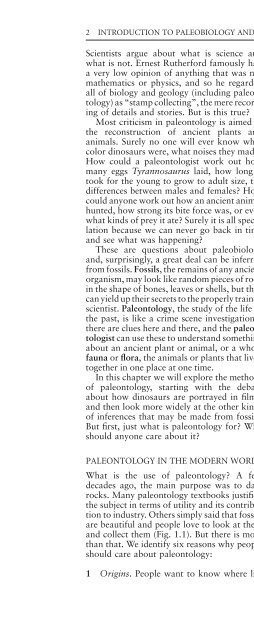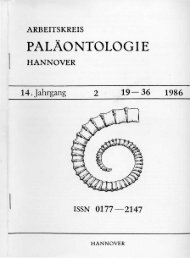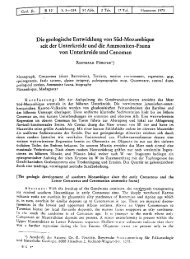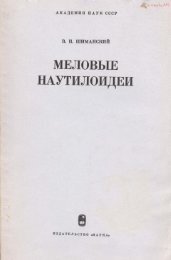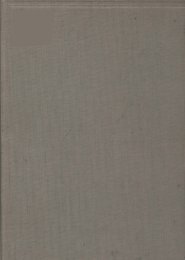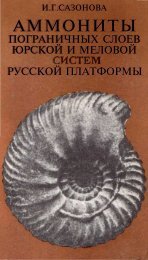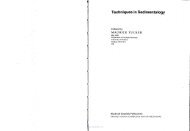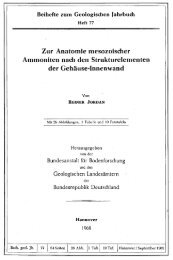- Page 2: Introduction to Paleobiology and th
- Page 6: Introduction to Paleobiology and th
- Page 10: Contents Full contents Preface vii
- Page 16: viii FULL CONTENTS The tree of life
- Page 20: x FULL CONTENTS Rise of the mammals
- Page 24: xii PREFACE (Copenhagen), Mike Bass
- Page 30: PALEONTOLOGY AS A SCIENCE 3 any mod
- Page 34: PALEONTOLOGY AS A SCIENCE 5 to disp
- Page 38: PALEONTOLOGY AS A SCIENCE 7 Box 1.1
- Page 42: PALEONTOLOGY AS A SCIENCE 9 monplac
- Page 46: PALEONTOLOGY AS A SCIENCE 11 ·LAMI
- Page 50: PALEONTOLOGY AS A SCIENCE 13 debate
- Page 54: PALEONTOLOGY AS A SCIENCE 15 simple
- Page 58: PALEONTOLOGY AS A SCIENCE 17 Animal
- Page 62: PALEONTOLOGY AS A SCIENCE 19 (a) (b
- Page 66: PALEONTOLOGY AS A SCIENCE 21 Hammer
- Page 70: FOSSILS IN TIME AND SPACE 23 The Ea
- Page 74: FOSSILS IN TIME AND SPACE 25 tions
- Page 78:
FOSSILS IN TIME AND SPACE 27 strata
- Page 82:
FOSSILS IN TIME AND SPACE 29 Box 2.
- Page 86:
FOSSILS IN TIME AND SPACE 31 Sectio
- Page 90:
FOSSILS IN TIME AND SPACE 33 3 boun
- Page 94:
FOSSILS IN TIME AND SPACE 35 Global
- Page 98:
(a) MRS SU MFS DS HST GS TST LST De
- Page 102:
FOSSILS IN TIME AND SPACE 39 m 100
- Page 106:
FOSSILS IN TIME AND SPACE 41 from o
- Page 110:
FOSSILS IN TIME AND SPACE 43 may be
- Page 114:
FOSSILS IN TIME AND SPACE 45 Box 2.
- Page 118:
FOSSILS IN TIME AND SPACE 47 Kalaha
- Page 122:
FOSSILS IN TIME AND SPACE 49 J J Cr
- Page 126:
FOSSILS IN TIME AND SPACE 51 400 Nu
- Page 130:
FOSSILS IN TIME AND SPACE 53 Trondh
- Page 134:
FOSSILS IN TIME AND SPACE 55 Review
- Page 138:
Chapter 3 Taphonomy and the quality
- Page 142:
TAPHONOMY AND THE QUALITY OF THE FO
- Page 146:
TAPHONOMY AND THE QUALITY OF THE FO
- Page 150:
TAPHONOMY AND THE QUALITY OF THE FO
- Page 154:
peat TAPHONOMY AND THE QUALITY OF T
- Page 158:
TAPHONOMY AND THE QUALITY OF THE FO
- Page 162:
TAPHONOMY AND THE QUALITY OF THE FO
- Page 166:
TAPHONOMY AND THE QUALITY OF THE FO
- Page 170:
TAPHONOMY AND THE QUALITY OF THE FO
- Page 174:
TAPHONOMY AND THE QUALITY OF THE FO
- Page 178:
TAPHONOMY AND THE QUALITY OF THE FO
- Page 182:
Chapter 4 Paleoecology and paleocli
- Page 186:
PALEOECOLOGY AND PALEOCLIMATES 81 e
- Page 190:
PALEOECOLOGY AND PALEOCLIMATES 83 0
- Page 194:
PALEOECOLOGY AND PALEOCLIMATES 85 B
- Page 198:
PALEOECOLOGY AND PALEOCLIMATES 87 l
- Page 202:
1 2 3 4 5 Herbivores Deposit feeder
- Page 206:
PALEOECOLOGY AND PALEOCLIMATES 91 (
- Page 210:
PALEOECOLOGY AND PALEOCLIMATES 93 c
- Page 214:
PALEOECOLOGY AND PALEOCLIMATES 95 B
- Page 218:
PALEOECOLOGY AND PALEOCLIMATES 97 B
- Page 222:
PALEOECOLOGY AND PALEOCLIMATES 99 (
- Page 226:
PALEOECOLOGY AND PALEOCLIMATES 101
- Page 230:
PALEOECOLOGY AND PALEOCLIMATES 103
- Page 234:
PALEOECOLOGY AND PALEOCLIMATES 105
- Page 238:
PALEOECOLOGY AND PALEOCLIMATES 107
- Page 242:
PALEOECOLOGY AND PALEOCLIMATES 109
- Page 246:
PALEOECOLOGY AND PALEOCLIMATES 111
- Page 250:
PALEOECOLOGY AND PALEOCLIMATES 113
- Page 254:
PALEOECOLOGY AND PALEOCLIMATES 115
- Page 258:
MACROEVOLUTION AND THE TREE OF LIFE
- Page 262:
MACROEVOLUTION AND THE TREE OF LIFE
- Page 266:
MACROEVOLUTION AND THE TREE OF LIFE
- Page 270:
MACROEVOLUTION AND THE TREE OF LIFE
- Page 274:
MACROEVOLUTION AND THE TREE OF LIFE
- Page 278:
MACROEVOLUTION AND THE TREE OF LIFE
- Page 282:
MACROEVOLUTION AND THE TREE OF LIFE
- Page 286:
MACROEVOLUTION AND THE TREE OF LIFE
- Page 290:
MACROEVOLUTION AND THE TREE OF LIFE
- Page 294:
MACROEVOLUTION AND THE TREE OF LIFE
- Page 298:
Chapter 6 Fossil form and function
- Page 302:
FOSSIL FORM AND FUNCTION 139 Box 6.
- Page 306:
(a) (b) 1 cm Figure 6.2 Sexual dimo
- Page 310:
FOSSIL FORM AND FUNCTION 143 Box 6.
- Page 314:
FOSSIL FORM AND FUNCTION 145 passes
- Page 318:
FOSSIL FORM AND FUNCTION 147 Late S
- Page 322:
FOSSIL FORM AND FUNCTION 149 Stylop
- Page 326:
FOSSIL FORM AND FUNCTION 151 the bo
- Page 330:
FOSSIL FORM AND FUNCTION 153 0 Wind
- Page 334:
FOSSIL FORM AND FUNCTION 155 the kn
- Page 338:
{ FOSSIL FORM AND FUNCTION 157 stan
- Page 342:
FOSSIL FORM AND FUNCTION 159 (a) (b
- Page 346:
FOSSIL FORM AND FUNCTION 161 Shubin
- Page 350:
MASS EXTINCTIONS AND BIODIVERSITY L
- Page 354:
MASS EXTINCTIONS AND BIODIVERSITY L
- Page 358:
MASS EXTINCTIONS AND BIODIVERSITY L
- Page 362:
MASS EXTINCTIONS AND BIODIVERSITY L
- Page 366:
MASS EXTINCTIONS AND BIODIVERSITY L
- Page 370:
MASS EXTINCTIONS AND BIODIVERSITY L
- Page 374:
MASS EXTINCTIONS AND BIODIVERSITY L
- Page 378:
MASS EXTINCTIONS AND BIODIVERSITY L
- Page 382:
MASS EXTINCTIONS AND BIODIVERSITY L
- Page 386:
MASS EXTINCTIONS AND BIODIVERSITY L
- Page 390:
Chapter 8 The origin of life Key po
- Page 394:
THE ORIGIN OF LIFE 185 membrane pri
- Page 398:
THE ORIGIN OF LIFE 187 protocell re
- Page 402:
THE ORIGIN OF LIFE 189 then from th
- Page 406:
THE ORIGIN OF LIFE 191 Bacteria Arc
- Page 410:
THE ORIGIN OF LIFE 193 Brasier and
- Page 414:
THE ORIGIN OF LIFE 195 (a) (b) Figu
- Page 418:
THE ORIGIN OF LIFE 197 (Fig. 8.11a)
- Page 422:
THE ORIGIN OF LIFE 199 Nucleus (n)
- Page 426:
THE ORIGIN OF LIFE 201 250 μm 25
- Page 430:
THE ORIGIN OF LIFE 203 Ciccarelli,
- Page 434:
PROTISTS 205 The world of microbes
- Page 438:
Ichthyospores PROTISTS 207 Plantae
- Page 442:
PROTISTS 209 Foraminifera Foraminif
- Page 446:
PROTISTS 211 spectrum of shapes, fr
- Page 450:
1.1 1.3 1.1 PROTISTS 213 Box 9.3 Mo
- Page 454:
PROTISTS 215 Allogromia R freshwate
- Page 458:
PROTISTS 217 Box 9.5 Classification
- Page 462:
Figure 9.11 Haeckel’s radiolarian
- Page 466:
PROTISTS 221 Netromorphs • Elonga
- Page 470:
PROTISTS 223 epitheca apex or anter
- Page 474:
PROTISTS 225 (c) (a) (b) (d) (e) (f
- Page 478:
PROTISTS 227 Box 9.10 Atomic force
- Page 482:
PROTISTS 229 epicingulum hypocingul
- Page 486:
PROTISTS 231 aperture recessed oper
- Page 490:
PROTISTS 233 tively late in the geo
- Page 494:
ORIGIN OF THE METAZOANS 235 ORIGINS
- Page 498:
ORIGIN OF THE METAZOANS 237 suggest
- Page 502:
ORIGIN OF THE METAZOANS 239 Neoprot
- Page 506:
ORIGIN OF THE METAZOANS 241 and res
- Page 510:
ORIGIN OF THE METAZOANS 243 Ma 500
- Page 514:
ORIGIN OF THE METAZOANS 245 Ediacar
- Page 518:
ORIGIN OF THE METAZOANS 247 Figure
- Page 522:
ORIGIN OF THE METAZOANS 249 walled
- Page 526:
ORIGIN OF THE METAZOANS 251 METAZOA
- Page 530:
ORIGIN OF THE METAZOANS 253 Recent
- Page 534:
ORIGIN OF THE METAZOANS 255 Box 10.
- Page 538:
ORIGIN OF THE METAZOANS 257 The rib
- Page 542:
ORIGIN OF THE METAZOANS 259 Ordovic
- Page 546:
THE BASAL METAZOANS: SPONGES AND CO
- Page 550:
THE BASAL METAZOANS: SPONGES AND CO
- Page 554:
THE BASAL METAZOANS: SPONGES AND CO
- Page 558:
THE BASAL METAZOANS: SPONGES AND CO
- Page 562:
THE BASAL METAZOANS: SPONGES AND CO
- Page 566:
THE BASAL METAZOANS: SPONGES AND CO
- Page 570:
THE BASAL METAZOANS: SPONGES AND CO
- Page 574:
THE BASAL METAZOANS: SPONGES AND CO
- Page 578:
THE BASAL METAZOANS: SPONGES AND CO
- Page 582:
THE BASAL METAZOANS: SPONGES AND CO
- Page 586:
THE BASAL METAZOANS: SPONGES AND CO
- Page 590:
THE BASAL METAZOANS: SPONGES AND CO
- Page 594:
THE BASAL METAZOANS: SPONGES AND CO
- Page 598:
THE BASAL METAZOANS: SPONGES AND CO
- Page 602:
THE BASAL METAZOANS: SPONGES AND CO
- Page 606:
THE BASAL METAZOANS: SPONGES AND CO
- Page 610:
THE BASAL METAZOANS: SPONGES AND CO
- Page 614:
THE BASAL METAZOANS: SPONGES AND CO
- Page 618:
Chapter 12 Spiralians 1: lophophora
- Page 622:
SPIRALIANS 1: LOPHOPHORATES 299 lin
- Page 626:
SPIRALIANS 1: LOPHOPHORATES 301 cha
- Page 630:
SPIRALIANS 1: LOPHOPHORATES 303 PAL
- Page 634:
SPIRALIANS 1: LOPHOPHORATES 305 “
- Page 638:
SPIRALIANS 1: LOPHOPHORATES 307 (a)
- Page 642:
SPIRALIANS 1: LOPHOPHORATES 309 num
- Page 646:
SPIRALIANS 1: LOPHOPHORATES 311 Lin
- Page 650:
SPIRALIANS 1: LOPHOPHORATES 313 the
- Page 654:
SPIRALIANS 1: LOPHOPHORATES 315 lop
- Page 658:
SPIRALIANS 1: LOPHOPHORATES 317 Box
- Page 662:
SPIRALIANS 1: LOPHOPHORATES 319 Pal
- Page 666:
SPIRALIANS 1: LOPHOPHORATES 321 0.0
- Page 670:
SPIRALIANS 1: LOPHOPHORATES 323 Loc
- Page 674:
SPIRALIANS 1: LOPHOPHORATES 325 Eas
- Page 678:
SPIRALIANS 2: MOLLUSKS 327 This fam
- Page 682:
SPIRALIANS 2: MOLLUSKS 329 Class SC
- Page 686:
SPIRALIANS 2: MOLLUSKS 331 Box 13.3
- Page 690:
SPIRALIANS 2: MOLLUSKS 333 expansio
- Page 694:
SPIRALIANS 2: MOLLUSKS 335 cardinal
- Page 698:
SPIRALIANS 2: MOLLUSKS 337 prismato
- Page 702:
SPIRALIANS 2: MOLLUSKS 339 Seawater
- Page 706:
SPIRALIANS 2: MOLLUSKS 341 penis ma
- Page 710:
SPIRALIANS 2: MOLLUSKS 343 (a) (b)
- Page 714:
SPIRALIANS 2: MOLLUSKS 345 siphuncl
- Page 718:
SPIRALIANS 2: MOLLUSKS 347 dorsal i
- Page 722:
(a) (b) (c) (d) (e) (f) (g) (h) (i)
- Page 726:
SPIRALIANS 2: MOLLUSKS 351 Box 13.7
- Page 730:
SPIRALIANS 2: MOLLUSKS 353 ally arr
- Page 734:
SPIRALIANS 2: MOLLUSKS 355 shelf po
- Page 738:
SPIRALIANS 2: MOLLUSKS 357 shell ap
- Page 742:
SPIRALIANS 2: MOLLUSKS 359 to recov
- Page 746:
Chapter 14 Ecdysozoa: arthropods Ke
- Page 750:
ECDYSOZOA: ARTHROPODS 363 Box 14.1
- Page 754:
ECDYSOZOA: ARTHROPODS 365 (a) (b) (
- Page 758:
ECDYSOZOA: ARTHROPODS 367 doublure.
- Page 762:
ECDYSOZOA: ARTHROPODS 369 protaspid
- Page 766:
ECDYSOZOA: ARTHROPODS 371 (a) (b) (
- Page 770:
ECDYSOZOA: ARTHROPODS 373 pelagic f
- Page 774:
ECDYSOZOA: ARTHROPODS 375 FAW PGW O
- Page 778:
ECDYSOZOA: ARTHROPODS 377 (a) (b) (
- Page 782:
ECDYSOZOA: ARTHROPODS 379 Box 14.5
- Page 786:
ECDYSOZOA: ARTHROPODS 381 Number of
- Page 790:
ECDYSOZOA: ARTHROPODS 383 (b) (a) (
- Page 794:
ECDYSOZOA: ARTHROPODS 385 Articulat
- Page 798:
ECDYSOZOA: ARTHROPODS 387 The Late
- Page 802:
Chapter 15 Deuterostomes: echinoder
- Page 806:
DEUTEROSTOMES: ECHINODERMS AND HEMI
- Page 810:
DEUTEROSTOMES: ECHINODERMS AND HEMI
- Page 814:
DEUTEROSTOMES: ECHINODERMS AND HEMI
- Page 818:
(a) (b) (d) (c) (e) Figure 15.5 Som
- Page 822:
DEUTEROSTOMES: ECHINODERMS AND HEMI
- Page 826:
DEUTEROSTOMES: ECHINODERMS AND HEMI
- Page 830:
DEUTEROSTOMES: ECHINODERMS AND HEMI
- Page 834:
DEUTEROSTOMES: ECHINODERMS AND HEMI
- Page 838:
DEUTEROSTOMES: ECHINODERMS AND HEMI
- Page 842:
DEUTEROSTOMES: ECHINODERMS AND HEMI
- Page 846:
DEUTEROSTOMES: ECHINODERMS AND HEMI
- Page 850:
DEUTEROSTOMES: ECHINODERMS AND HEMI
- Page 854:
DEUTEROSTOMES: ECHINODERMS AND HEMI
- Page 858:
DEUTEROSTOMES: ECHINODERMS AND HEMI
- Page 862:
DEUTEROSTOMES: ECHINODERMS AND HEMI
- Page 866:
DEUTEROSTOMES: ECHINODERMS AND HEMI
- Page 870:
DEUTEROSTOMES: ECHINODERMS AND HEMI
- Page 874:
DEUTEROSTOMES: ECHINODERMS AND HEMI
- Page 878:
Chapter 16 Fishes and basal tetrapo
- Page 882:
FISHES AND BASAL TETRAPODS 429 grow
- Page 886:
FISHES AND BASAL TETRAPODS 431 Box
- Page 890:
FISHES AND BASAL TETRAPODS 433 (c)
- Page 894:
FISHES AND BASAL TETRAPODS 435 Solv
- Page 898:
FISHES AND BASAL TETRAPODS 437 Numb
- Page 902:
FISHES AND BASAL TETRAPODS 439 Box
- Page 906:
FISHES AND BASAL TETRAPODS 441 Box
- Page 910:
FISHES AND BASAL TETRAPODS 443 eart
- Page 914:
FISHES AND BASAL TETRAPODS 445 250
- Page 918:
FISHES AND BASAL TETRAPODS 447 Quat
- Page 922:
large orbit (a) 5 mm (b) 20 mm toot
- Page 926:
FISHES AND BASAL TETRAPODS 451 Dino
- Page 930:
Chapter 17 Dinosaurs and mammals Ke
- Page 934:
DINOSAURS AND MAMMALS 455 (a) (c) (
- Page 938:
DINOSAURS AND MAMMALS 457 (a) (b) F
- Page 942:
DINOSAURS AND MAMMALS 459 (a) 30,00
- Page 946:
DINOSAURS AND MAMMALS 461 Box 17.2
- Page 950:
DINOSAURS AND MAMMALS 463 Box 17.3
- Page 954:
DINOSAURS AND MAMMALS 465 Box 17.5
- Page 958:
DINOSAURS AND MAMMALS 467 Box 17.6
- Page 962:
elongate humerus fused radius and u
- Page 966:
names Archonta and Glires, and it m
- Page 970:
DINOSAURS AND MAMMALS 473 Gorillas,
- Page 974:
DINOSAURS AND MAMMALS 475 50 mm (a)
- Page 978:
DINOSAURS AND MAMMALS 477 Neanderta
- Page 982:
Chapter 18 Fossil plants Key points
- Page 986:
FOSSIL PLANTS 481 (a) (c) 0.1 mm ca
- Page 990:
FOSSIL PLANTS 483 Figure 18.3 Sporo
- Page 994:
FOSSIL PLANTS 485 Box 18.2 Classifi
- Page 998:
FOSSIL PLANTS 487 spores 2n 2n n n
- Page 1002:
FOSSIL PLANTS 489 The giant lycopsi
- Page 1006:
FOSSIL PLANTS 491 Lepidostrobophyll
- Page 1010:
FOSSIL PLANTS 493 warmth. Hence see
- Page 1014:
FOSSIL PLANTS 495 Botanical classif
- Page 1018:
FOSSIL PLANTS 497 (a) (b) (c) (d) (
- Page 1022:
FOSSIL PLANTS 499 Box 18.5 Reconstr
- Page 1026:
FOSSIL PLANTS 501 (a) (c) (b) top o
- Page 1030:
FOSSIL PLANTS 503 living gnetalean
- Page 1034:
FOSSIL PLANTS 505 40 Number of angi
- Page 1038:
FOSSIL PLANTS 507 ture change in No
- Page 1042:
Chapter 19 Trace fossils Key points
- Page 1046:
TRACE FOSSILS 511 Box 19.1 Jumping
- Page 1050:
TRACE FOSSILS 513 (a) (c) (a) (b) (
- Page 1054:
TRACE FOSSILS 515 (a) (b) (c) (d) p
- Page 1058:
TRACE FOSSILS 517 Figure 19.8 Trace
- Page 1062:
TRACE FOSSILS 519 1 2 3 (a) 4 Figur
- Page 1066:
TRACE FOSSILS 521 FL SL SL FL Figur
- Page 1070:
TRACE FOSSILS 523 Box 19.6 The nine
- Page 1074:
TRACE FOSSILS 525 3 2 2 3 4 5 1 2 3
- Page 1078:
TRACE FOSSILS 527 and traces are lo
- Page 1082:
TRACE FOSSILS 529 There is rare evi
- Page 1086:
TRACE FOSSILS 531 • Colonization
- Page 1090:
Chapter 20 Diversification of life
- Page 1094:
DIVERSIFICATION OF LIFE 535 Box 20.
- Page 1098:
DIVERSIFICATION OF LIFE 537 because
- Page 1102:
CAMBRIAN FAUNA 1. Trilobita 2. Inar
- Page 1106:
DIVERSIFICATION OF LIFE 541 models
- Page 1110:
Time (Ma) 0 5 10 15 20 25 30 35 40
- Page 1114:
DIVERSIFICATION OF LIFE 545 major s
- Page 1118:
DIVERSIFICATION OF LIFE 547 Time (M
- Page 1122:
DIVERSIFICATION OF LIFE 549 communi
- Page 1126:
DIVERSIFICATION OF LIFE 551 sized p
- Page 1130:
DIVERSIFICATION OF LIFE 553 Maynard
- Page 1134:
GLOSSARY 555 analog a feature of tw
- Page 1138:
GLOSSARY 557 cellulose a carbohydra
- Page 1142:
GLOSSARY 559 dibranchiate “two-ar
- Page 1146:
GLOSSARY 561 biomass of primary pro
- Page 1150:
GLOSSARY 563 intelligent design (ID
- Page 1154:
GLOSSARY 565 teeth, cheek teeth, in
- Page 1158:
GLOSSARY 567 peristome “around mo
- Page 1162:
GLOSSARY 569 rhizome “root”; an
- Page 1166:
GLOSSARY 571 taxon a group of organ
- Page 1170:
Appendix 1 Stratigraphic chart
- Page 1174:
Appendix 2 Paleogeographic maps 30
- Page 1178:
apomorphies 130, 132 Appalachian-Ca
- Page 1182:
evolution 357 life attitude 352, 35
- Page 1186:
iotic replacements 545-6 competitiv
- Page 1190:
fossil assemblages 26 associations
- Page 1194:
Late Cambrian extinction event 178
- Page 1198:
“great oxygenation event” 189-9
- Page 1202:
classification 211, 214, 217 evolut
- Page 1206:
swimming structures 130 symbiosis 9


